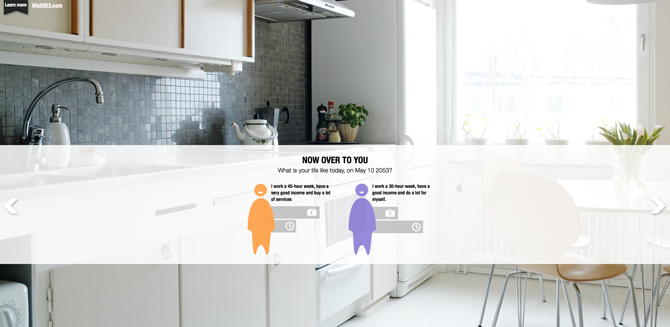Prototyping the Future
The project ”Prototyping the Future” aims at developing hands-on and accessible visualisations of a sustainable and energy-efficient future. In this way, we want to normalise sustainable lifestyles. Here you can test drive our prototype.

If the entire global population lived by the standards of an average Swede it would take three planet Earths to support us all. Thus, to achieve a sustainable society we need to change our ways of life.
Imagining what a sustainable society could look like and how to get there can be hard. Partly because present structures and trends can appear almost impossible to alter – how will we ever be able to break out of this consumption bonanza? Partly because a sustainable future can appear so dull – no holiday trips to Barcelona, no fancy apartments, no basmati rice? One reason to why a sustainable future might seem dull is because it often is depicted on basis of a number of restrictions only – we are lacking desirable alternatives.
The aim of the project "Prototyping the Future" is to develop concrete and accessible images of a future in which we have cut down our energy use and GHG emissions by half. To achieve this the project brings together a multidisciplinary team that includes researchers from design, future studies and environmental systems analysis with practitioners in product, service and digital design.
Instead of developing yet another scenario of sustainable urban life we take as a starting point for our design process the book Images of the Future City: Time and Space for Sustainable Development (Höjer et al. 2011). To concretize images of the future of a more sustainable society the project makes use of prototype based design methods. The development and deployment of prototypes and models is a powerful design method used to concretize and visualize new ideas, concepts and products. Prototypes can also be used to create a common platform for discussion between different actors. Through visualizing and concretizing how the different actors apprehend the idea, concept or product potential differences can be made explicit and addressed in a constructive manner.
What we see before us is some kind of digital experience, or game, where a user by her/himself or in a group can explore what a sustainable lifestyle could be like. The aim is to make this ‘game’ available on the internet and also to log how users interact and what choices they make. In order to get feedback for further development we strive to create a prototype that is open, inviting and accessible for a multitude of different users. The project Prototyping the Future is however best looked upon as a prototype in itself, a first attempt to combine design methods, future studies, environmental systems analyses with prototyping methods and digital tools for design.
Project Design
The project runs from August 2012 to December 2013 and comprise three main phases that run partly in parallell. In the firs phase - the research phase - an overview of existing research and other projects that in one way or another have visualised sustainable futures and sustainable lifestyles. Some examples of such projects are SPREAD Sustainable Lifestyles 2050, IDEO Living Climate Change and Sustainable Everyday Project. In order to test the project methodology a pilot project was carried out during the autumn 2012. This was done in collaboration with Konstfack - University College of Arts, Craft and Design - where third year students in Industrial Design were asked to develop prototypes of products, services or systems that could form part of future sustainable lifestyles. The second phase - the design phase - is carried out in close coopertion with the design parter of the project Veryday (former known as Ergonomidesign) and seeks to develop a numer of design concepts for the form and content of the digital experience. Following this is the third phase - the development phase - where game and IT developers are engaged to create the actual prototype.

